It has been a strange 12 months in the world due to Covid-19 and the cinema landscape has been forever changed by it. But there are always silver linings. For the first time ever, the Sundance Film Festival was almost entirely an online event, which meant many critics long held away from the legendary festival due to cost, access, or inability to travel, were able to “attend” Sundance screenings. As a result, Sundance had its highest audience exposure ever which not only helped the Festival gain wider popularity but also helped more people see extraordinary films.
Wider access helps both little known films and award contenders to flourish in this online world and, most importantly, a lot sooner. For example, the award darling Minari won the Grand Jury Prize at Sundance back in January of 2020. Fourteen months later, the film will premiere in theaters for the public to see. That’s quite a gap from the initial release for a select group of viewers to a wide audience. With that gap now closed with online access and satellite screenings in outdoor/safe venues, films are getting a lot more attention more quickly.
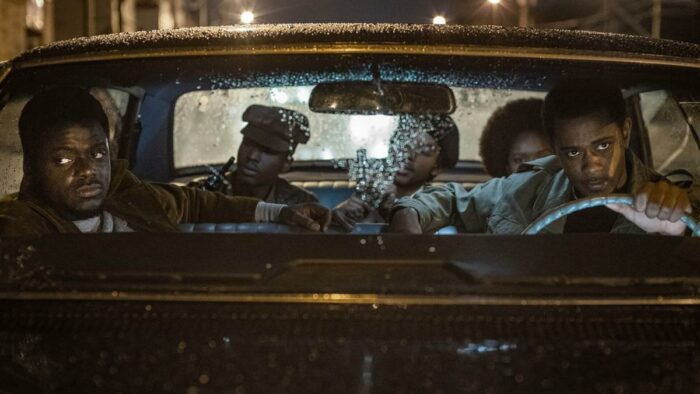
This new-found hype can most definitely affect awards season. With extended eligibility time due to Covid, the Oscars can now see releases in January and February (previously a dumping ground for the studio’s cast-offs and failures) that may have been overlooked in an overstuffed December. Judas and the Black Messiah is one of those award-caliber films that benefits greatly from a February release. And thanks to the incredible folks at The Loft Cinema in Tucson, AZ, I was able to see Judas and the Black Messiah’s Sundance premiere live and with safety (it was an open-air theater) on February 1st.
Now there is a difference between an award wannabe (the dreaded Oscar Bait; see my review of The Goldfinch as Exhibit A) and an actual contender. Judas and the Black Messiah just so happens to be an honest contender and, if the cinema gods were just, would reward it heavily in nearly every category. Director Shaka King’s biopic of Black Panther leader and activist Fred Hampton is an electric powerhouse of a film, confident in its tone and direction with fierce performances from the entire cast and an effortless ability to transport the viewer to the past.
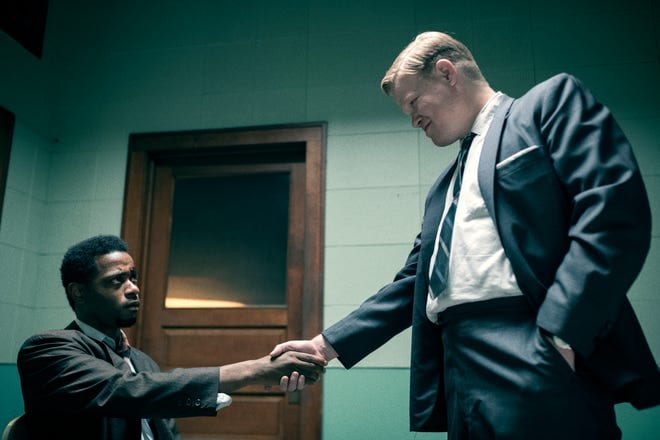
Martin Luther King and Malcolm X have been assassinated. Those pillars of civil rights and black self-determination were long seen as the dreaded “Black Messiah” by the FBI. J Edgar Hoover (Martin Sheen), still unsatisfied with continued “subversion” from minorities in the US, looks to extend his net over the country and stop future “Black Messiahs” from gaining influence by infiltrating and destroying perceived enemies of the state from within. At the center of the FBI’s latest operation is the Illinois chapter of the Black Panther Party, led by firebrand Fred Hampton (Daniel Kaluuya). Hampton’s incredible oratory skills and boundary-pushing, violent rhetoric moves the FBI to get Hampton out of the way before he can rise to MLK or Malcolm X levels of power.
Assigned the task is FBI agent Roy Mitchell (Jesse Plemons) who convinces car thief Bill O’Neal (LaKeith Stanfield) to avoid a jail sentence by infiltrating the Chicago Black Panther Party as a new member and find dirt on Hampton that will get him arrested. While O’Neal initially agrees to the arrangement, he finds himself on continuously shifting ground when Hampton’s increasing influence leads to a consolidation of gang power in Chicago and an eventual bloody conflict with local police officers that leave many killed on both sides. Filled with guilt at destroying those that have become family but also dedicated to his mission, O’Neal is constantly pushed to the moral brink when faced with the ultimate betrayal.
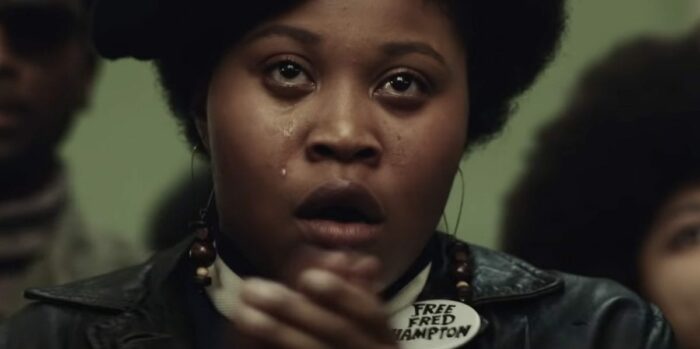
Daniel Kaluuya (Get Out, Black Panther) is justifiably being recognized by awards bodies for his fiery performance as the complex and ambiguous figure of Fred Hampton. The Golden Globes and Screen Actors Guild have nominated him for Best Supporting Actor and there is no reason not to expect that to carry over into the Oscars ceremony. Hampton is not given special treatment by the screenplay, depicted purposefully as ethically ambiguous. While Hampton does a lot for the Chicago community and even finds non-violent ways to lower racial violence between minority groups by joining forces with rival gangs, he also doesn’t exactly step away from the honor-among-thieves mentality of executing “rats” and literally fighting the power. It is a credit to both director King and Kaluuya that someone so conflicting can elicit sympathy and care from the audience.
And while Kaluuya is simply phenomenal as Hampton, the true star of the picture is LaKeith Stanfield (Uncut Gems, Knives Out) as Bill O’Neal. Often stealing the show as a supporting piece in various films, Judas and the Black Messiah allows Stanfield to take center stage as the titular Judas. Caught in an emotional maze, as well as a legal conundrum, Stanfield finds himself at ethical dead-ends, and his slowly deteriorating psyche is masterfully built slowly and subtly thanks both to Stanfield’s innate acting instincts and a well-polished script by King and Will Berson. I have been very vocal on social media that Stanfield gets the attention he deserves for such a vulnerable and emotionally complex performance.
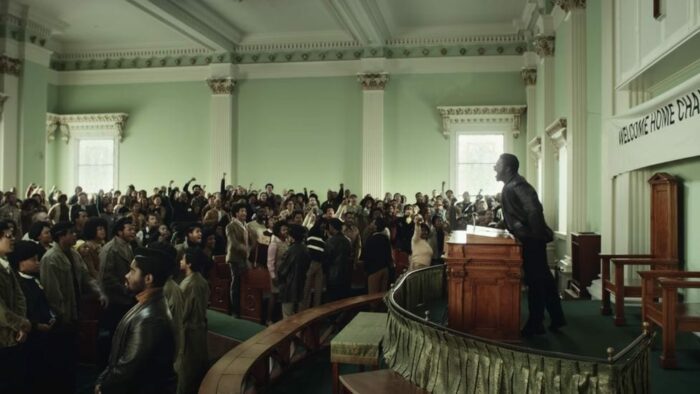
Given significantly less moral ambiguity is Plemon’s FBI agent Mitchell, who only partially struggles with his task of taking down Hampton before clamping down and man-handling O’Neal to the point of no return. At least Mitchell is given moments of sympathy. Martin Sheen’s J Edgar Hoover is the pure embodiment of evil. Unlike Clint Eastwood’s more flattering portrayal of the FBI leader with Leonardo DiCaprio in J. Edgar in 2011, Shaka King allows Hoover’s well-documented evil (and illegal) actions to speak for themselves. It is a small but utterly chilling performance by a man many of us see as a President!
Though Judas and the Black Messiah follows a familiar narrative path (this plays out like many a mob movie and hits the expected beats), its dedication to period accuracy lifts the film entirely. For many, this period of US history might be unknown territory, and the flawless recreation of 1960s Chicago from the physical locations and set design to the unflashy and well-worn costumes breathes life into a story many will find familiar. Judas the Black Messiah doesn’t reinvent the wheel but it certainly stays honest treading familiar ground. It is this dedication to authenticity that propels Judas and the Black Messiah over other period pieces, like The Trial of the Chicago 7, which feel more like people playing dress-up than actually inhabiting their world.
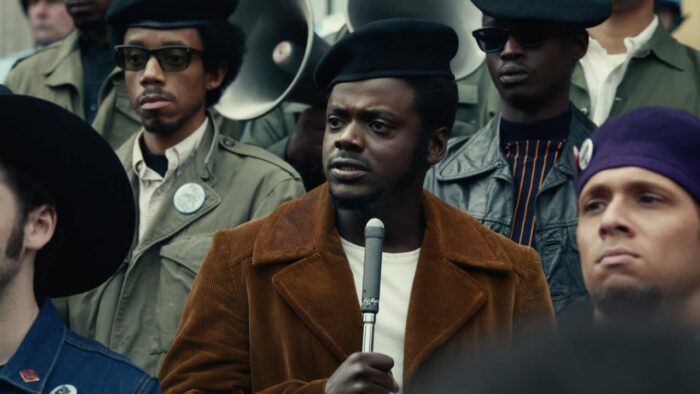
The years 2020 and 2021 have been exceptional years for black actors and filmmakers. Along with Kingsley Ben-Adir in One Night in Miami, Delroy Lindo in Da 5 Bloods, Chadwick Boseman in both Ma Rainey’s Black Bottom and Da 5 Bloods, John Boyega in Small Axe: Red, White and Blue, and Kaluuya and Stanfield here, it would be truly revolutionary for a group like the Academy to recognize them all. I remain skeptical even some of these actors will even get a nomination, let alone a win, but the progressive road of cinema is knocking down walls and shattering glass ceilings and eventually, recognition must be given. Judas and the Black Messiah shows the power of black voices telling stories of black history to wide audiences. It is simply electric and must not be ignored.
Judas and the Black Messiah will be released in theaters and on HBO Max on February 12th.



